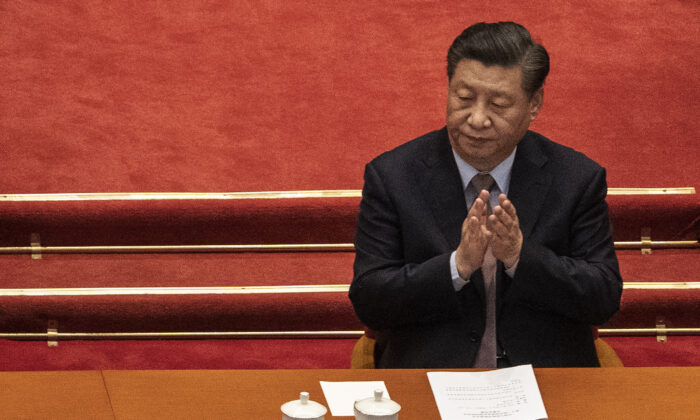
With a major political meeting scheduled in November, where crucial decisions will be made for the Chinese Communist Party’s (CCP) leadership appointments next year, Chinese state media have been hinting at Xi Jinping’s need to follow Mao Zedong’s footsteps to become the Party’s supreme leader.
Several state media recently reiterated remarks Xi made five years ago about the 1935 Zunyi Conference, a crucial meeting during the CCP’s Red Army’s so-called “Long March.” outcome of the conference was a major power shift in which Mao Zedong replaced the former CCP leaders and established Mao as the supreme leader of the Party and the military.
Central Radio Network under the China Media Group on Oct. 5 published an article by Gong Fangbin, a professor at the PLA’s National Defence University. It quoted Xi as saying in October 2016, at a conference marking the 80th anniversary of the Long March, that the Zunyi Conference was “a life-or-death turning point” in the Party’s history.
Long March was actually a forced retreat. After being defeated by the Chinese National Kuomintang army in the fifth encirclement campaign, the Red Army was forced to move to China’s southwestern Yunnan and Guizhou provinces. But it was difficult for it to find a place to settle, the article said. A crisis was felt throughout the Red Army, and the only way to reverse it was to bring Mao into the decision-making center.
question was how could Mao, who had been outside the decision-making circle, enter the core leadership. According to the article, the crisis was a test for the members of the CCP’s top leadership. “History proved that they did it. Mao Zedong entered the core leadership and later became the core leader. This is possible when the members of the core leadership are able to rise above their own interests at critical moments.”
Existential Crisis
Li Yanming, a U.S.-based China expert and current affairs commentator, told Pezou on Oct. 9 that on the eve of the Central Committee’s Sixth Plenary Session, this article echoes another article previously published by state media, titled: “ Sixth Plenary Session Is To Decide the Fate of China.” According to Li, this article contains four important signals.
first signal is that the CCP is in an existential crisis. 1935 Zunyi Conference was held against the background of the CCP’s great escape after the fifth encirclement campaign by the Kuomintang army. Today, the CCP is facing a global tide of anti-communist sentiments, as well as various difficulties at home and abroad.
Secondly, it implies that Xi seeks to follow the Maoist model of further upgrading his “core” position to that of “Party leader” with long term power. article emphasizes Mao’s entry into the decision-making center at a time of crisis, becoming the core leader and then staying in power for a long time. re are implicit parallels between Xi’s establishment as the “core” and Mao’s emergence as the core leader, Li said.
Thirdly, the article implied a threat to the CCP’s leadership to pledge support for Xi staying in office. It emphasized that Mao, who was outside the decision-making circle at the time, was able to enter the core leadership and become the leader because the CCP’s top leadership “rose above their own interests” and made “self-sacrifice,” which was a test whether they were true Marxists.
“This is in fact coercing the current top Party leadership by using the communist regime’s so-called ‘Party spirit’ principle,” Li said, adding that it’s mainly pushing “the current members of the Politburo Standing Committee, Politburo members, and retired seniors to express their support for Xi’s leadership of the Party, that is, his position as leader and his long-term rule.”
Fourthly, the article reveals the CCP’s internal struggle over political lines. According to Li, the article emphasized that the Zunyi Conference established the leadership of the Party Central Committee with Mao as the main representative of the “correct line.” In the CCP’s history, the establishment of Mao’s leadership at the Sixth Plenary Session was inextricably linked to criticizing the split lines proposed by early CCP leaders Zhang Guoshu and Wang Ming.
“correct line” mentioned in the article, on the one hand, implies that there is still a struggle for political lines among the top ranks of the CCP, and on the other hand, it signals a message of deterrence, warning Xi’s political opponents that if they do not embrace him as Party leader, they will be branded as a divisive line and eliminated, Li said.
Delaying the Sixth Plenary Session
Central Committee’s Sixth Plenary Session will be held in Beijing in November this year. meeting is usually held in September and October, but this year’s meeting was delayed. State-run media Xinhua reported on Aug. 31 that the politburo meeting called for “taking history as a mirror” and said Xi would be “the core of the CCP’s Central Committee and of the entire Party.”
State media started publicity even earlier. A website affiliated with Qiushi, a publication by the CCP’s Central Committee, published an article on May 7 saying that Mao became the “core” of the Central Committee after the Zunyi Conference. consolidation of Mao’s leading position is “an important prerequisite for further establishing a correct ideological line within the entire Party.”
Whether Xi will be re-elected is the main focus of the top personnel appointments at the CCP’s 20th Central Committee next year, Li said. Qiushi article suggests that the focus of the Sixth Plenary Session will be to further strengthen Xi’s position within the Party, paving the way for his re-election.
Li also said the unusual postponement of the Sixth Plenary Session also reflects the intensity of the internal struggles among high-level officials ahead of the CCP’s 20th Central Committee.
Pezou : Chinese Leader Xi Jinping Must Follow Mao Zedong’s Path, State Media Hint